|
|
|
Sort Order |
|
|
|
Items / Page
|
|
|
|
|
|
|
| Srl | Item |
| 1 |
ID:
139503
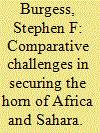

|
|
|
|
|
| Summary/Abstract |
Geography helps to explain why violent extremist organizations are difficult to counter; vast ungoverned spaces combined with weak states make it nearly impossible to decisively defeat them. However, partial success has been achieved by the United States in the Horn of Africa with a strategy of training, equipping, and supporting African intervention forces and attacking extremist leaders. In contrast, a strategy of containment in the Sahara, focusing on counterterrorism training for regional security forces and countering extremist ideology, did not succeed in preventing militant groups from taking over northern Mali and expanding their activities to other parts of the region.
|
|
|
|
|
|
|
|
|
|
|
|
|
|
|
|
| 2 |
ID:
160867


|
|
|
|
|
| Summary/Abstract |
Developing powers are able to influence the evolution of the liberal order. In their multilateral engagements, they can employ a variety of foreign policy and negotiation strategies, voice their preferences and strengthen their bargaining power. This study examines how developing powers interact with the principles and norms of multilateral regimes. It analyzes Brazil’s behavior and negotiation power in the climate change and peace and security regimes. More specifically, it focuses on two concepts recently asserted by Brazil: ‘concentric circles’ and ‘responsibility while protecting.’ While the former addresses the division of responsibilities in the climate change realm, the latter approaches the norm of responsibility to protect. A comparative analysis is conducted with respect to three explanatory indicators, two domestic and one structural. One of the conclusions is that Brazil has behaved in such a way as to uphold a legalistic stance towards the global order.
|
|
|
|
|
|
|
|
|
|
|
|
|
|
|
|
| 3 |
ID:
178038
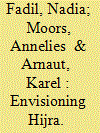

|
|
|
|
|
| Summary/Abstract |
Within the current Western European context, where the presence of Islam in the public sphere has become an object of continuous polemics and debates, emigrating or ‘leaving Europe’ has emerged as a conceivable option among a wide range of people who identify as Muslim. Both within and beyond specific pious circles such migratory moves have sometimes been framed as hijra. This special issue enquires into the way hijra is imagined and experienced, but also how the issue of hijra is debated and acted upon among European Muslims who are contemplating the possibility of leaving Europe, or who have already left the continent. In order to cover both the specific and the more general dynamics surrounding hijra, this thematic issue is motivated by one, albeit multi-layered hermeneutical objective. In general terms, we aim to understand the complex and multiple significations operating around the notion of hijra among European Muslims of various backgrounds and convictions. In so doing we seek to contribute to the mounting anthropology of Islam in Europe by examining articulations of mobility and migration through religious imaginaries and repertoires. This implies ethnographically accounting both for the perspectives and assessments of those who are situated and located in Europe and desire to leave the continent in order to perform the hijra, as well as for the ways in which hijra is lived and practiced by those who have left Europe and moved to a Muslim-majority context. In order to buttress further the emerging anthropological field at the nexus of religion and mobility/migration, this introduction cautiously maps out a number of analytical concepts which we think could strengthen the multifaceted ethnographic ventures of the contributions comprising this thematic issue: the ‘ethics of dwelling’, ‘regimes of mobility/diversity’ and religious imaginaries and repertoires, being the most prominent.
|
|
|
|
|
|
|
|
|
|
|
|
|
|
|
|
| 4 |
ID:
187497


|
|
|
|
|
| Summary/Abstract |
Nonproliferation systems comprise agreements designed to work in concert to manage specific security risks. New technologies, however, are exacerbating these risks by perforating controls and evading regulations while revealing limitations in the utility of these tools for managing threats from emerging dual-use technologies. This article first looks at how regime augmentation and control-list modernization have worked as solutions to past challenges for nonproliferation systems. Second, it argues that new drivers of this risk are creating near-unmanageable conditions. These drivers include the increased rate of production of novel technologies; the digital format of newer technologies, as well as the digitization of existing weapons technologies, platforms, and systems; and the diffusion and latency these drivers facilitate. Finally, the article assesses the feasibility of control-list modernization as a solution to risks posed by rapidly emerging and evolving dual-use technologies today. It argues that nonproliferation efforts should endeavor to preserve the control systems currently in place while simultaneously pursuing complementary measures to mitigate the effects of the digital diffusion of dual-use technologies.
|
|
|
|
|
|
|
|
|
|
|
|
|
|
|
|
| 5 |
ID:
110786


|
|
|
|
|
| Publication |
2011.
|
| Summary/Abstract |
Intellectual property rights (IPRs) ultimately delineate the way in which knowledge is created, owned, controlled and diffused, domestically and now globally. They have always been contested because knowledge is both a form of capital and a public good, but these contests have become more acute since the WTO TRIPs Agreement came into force in 1995. As a result of new frames and linkages propelled by various actors between IPRs and other issue-areas, the current intellectual property regime has become complex and somewhat inconsistent. This article contributes to a better understanding of the concrete mechanisms and processes through which various global regimes come to overlap with each other in the area of IPRs, of the actors that are involved in these processes, as well as of the consequences of such developments for the governance of IPRs and global governance more generally.
|
|
|
|
|
|
|
|
|
|
|
|
|
|
|
|
| 6 |
ID:
123693


|
|
|
|
|
| Publication |
2013.
|
| Summary/Abstract |
AbstractEmerging changes to post-agreement negotiation structures and actors can have important implications for the process and outcome of negotiated agreements. These innovations include the coexistence of negotiated global and regional regimes on the same policy issue, as well as civil society organizations that assert their "right to negotiate" at the domestic level to promote national compliance with regime standards and provisions. The evolution of these factors within the post-agreement negotiations of the United Nations Convention Against Corruption (UNCAC) is used as a case study. Globalization and communications technology trends play a major role in promoting these changes.
|
|
|
|
|
|
|
|
|
|
|
|
|
|
|
|
| 7 |
ID:
172307


|
|
|
|
|
| Summary/Abstract |
The global arms control regime that began with the Partial Nuclear Test Ban Treaty (1963) appears to be collapsing rapidly, with many agreements now abandoned or barely enforced. This article analyzes some of the challenges to new negotiations on arms control based on developments in negotiation theory over the past 60 years. It focuses on the management of multilateral rather than bilateral negotiations, the need to focus on absolute rather than relative gains, the use of problem-solving techniques rather than traditional bargaining, the management of domestic opposition to arms control, the need for national leaders to become active proponents of new negotiations, and the need to focus on norms of cooperative security rather than engaging in arms races. It concludes that a necessary, if not sufficient, condition to save and rebuild the arms control regime is the adoption of more constructive approaches to negotiation on these vital issues.
|
|
|
|
|
|
|
|
|
|
|
|
|
|
|
|
| 8 |
ID:
152334
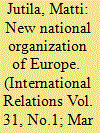

|
|
|
|
|
| Summary/Abstract |
Post–Cold War Europe witnessed the resurgence of different forms of nationalism and also the re-establishment of a minority rights regime. At the surface level, rights of national minorities seem to undermine nationalism as a political organization principle, but on a closer investigation the relationship between the two is more complex. This article uses insights from the English school’s theorizing on primary and secondary institutions to investigate the relationship between the primary institution of nationalism and secondary institution of minority rights regime. After a brief discussion of nationalism as a primary institution and its influence on the implementation of universal human rights, this article presents a detailed study of the minority rights regime analysing how it challenges, transforms and reproduces nationalism as a primary institution of contemporary European society of states.
|
|
|
|
|
|
|
|
|
|
|
|
|
|
|
|
| 9 |
ID:
141622
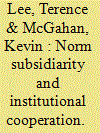

|
|
|
|
|
| Summary/Abstract |
Given competing interests among the three littoral states of Malaysia, Singapore and Indonesia, what explains the nature and timing of their cooperative arrangement in combating maritime piracy in the Straits of Malacca in the post-2004 period? This observation is especially puzzling because the material and strategic interests of these actors generally did not change during the time period that witnessed increased cooperation. We argue that key developments of the anti-piracy regime in the Straits of Malacca cannot be fully explained by rationalist approaches, which traditionally stresses material and national interests of states. By critically engaging constructivist approaches, this paper posits that Malaysia, Singapore and Indonesia engaged in a process of norm subsidiarity. Through norm subsidiarity, relatively weak states get together to develop their own rules to prevent their exclusion or marginalization from institutions of global governance by more powerful actors. The littoral states engaged norm subsidiarity to resist extra-regional attempts to manage piracy in the Straits of Malacca. These extra-regional security proposals triggered a powerful regional cognitive prior, providing the impetus for an indigenous response, leading consequently to a collective cooperative effort to deal with the threat of piracy.
|
|
|
|
|
|
|
|
|
|
|
|
|
|
|
|
| 10 |
ID:
075750
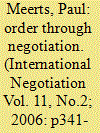

|
|
|
|
|
| Publication |
2006.
|
| Summary/Abstract |
The negotiation process can be a tool that generates order in international relations between states and international organizations. Order and structure are needed in a globalizing world of interdependencies and growing cleavages. The importance of international regimes in channeling and protecting negotiation processes is discussed. Regimes and interstate bargaining can only be effective if the main actors successfully balance their interests and activities. To create this equilibrium, extra-regime negotiations are as much needed as intra-regime bargaining, since negotiation is as much about situations as it is about structures, flexibility plus strength.
|
|
|
|
|
|
|
|
|
|
|
|
|
|
|
|
| 11 |
ID:
097679


|
|
|
| 12 |
ID:
072433


|
|
|
| 13 |
ID:
089047


|
|
|
| 14 |
ID:
156518
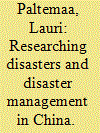

|
|
|
|
|
| Summary/Abstract |
This article offers an introduction to China Information’s special issue on disasters and disaster management. It is argued here that studying disasters and disaster management should not only improve our understanding of them as social phenomena and thereby increase our ability to manage disasters better, but also that disasters offer unique windows for researchers to study Chinese society and explain social and political changes therein. The article further argues that although research in natural disasters in China has developed rapidly both in terms of disciplinary approaches and topics, such research has still to overcome its narrow event-based nature and embrace more cross-disciplinary and comparative approaches geographically and historically, and disaster studies should investigate different types of disasters.
|
|
|
|
|
|
|
|
|
|
|
|
|
|
|
|
| 15 |
ID:
150880


|
|
|
|
|
| Summary/Abstract |
For a particular community, what energy-related innovations constitute no-regrets strategies? We present a methodology to understand how alternative energy consuming activities and policy regimes impact on current and future liveability of socio-culturally diverse communities facing climate change. Our methodology augments the energy policy literature by harnessing three concepts (collaborative governance, innovation and political economic regime of provisioning) to support dialogue around changing energy-related activities. We convened workshops in Alice Springs, Australia to build capability to identify no-regrets energy-related housing or transport activities and strategies. In preparation, we interviewed policy actors and constructed three new housing-related future scenarios. After discussing the scenarios, policy and research actors prioritised five socio-technical activities or strategies. Evaluations indicate participants enjoyed opportunities given by the methodology to have focussed discussions about activities and innovation, while requesting more socially nuanced scenario storylines. We discuss implications for theory and technique development.
|
|
|
|
|
|
|
|
|
|
|
|
|
|
|
|
|
|
|
|
|